Are Vegan Eggs Healthier Than the Real Thing?
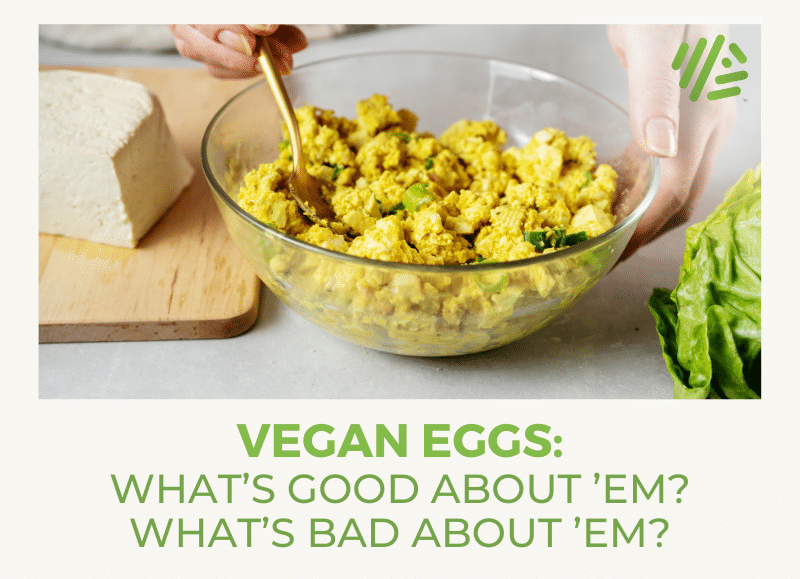
Contents
For people looking to switch to a plant-based diet, reducing the amount of animal protein we eat every day can be challenging. Even more difficult may be letting go of some of our favorite products, like milk, eggs, and cheese.
It seems like we’ve always had almond and coconut milk as dairy-free alternatives, but what about eggs?
In this post, we’ll examine what we know today about vegan eggs, plus a taste test of one popular brand, VeganEgg by Follow Your Heart.
What are Vegan Eggs?
Vegans have long been using egg substitutes in their cooking, mainly for baking. You can use mashed bananas, for example, or ground flax seed with water to replace an egg in recipes. Other popular egg substitutes include applesauce, silken tofu, corn starch, soy protein powder, chickpea flour, and arrowroot.
One big draw of vegan eggs is that although they are plant-based eggs, they can be made to resemble the taste and structure of regular eggs. For example, VeganEgg uses algae protein (algal flour) that surprisingly can “scramble” like a regular egg. So, rather than just hiding your egg substitute in homemade muffins or pancakes, you can actually enjoy the egg (supposedly) on its own.
Other vegan eggs include Beyond Eggs from Silicon Valley startup Hampton Creek Foods, which was the first company to create plant-based eggs in September 2013, just four short years ago. Bill Gates even backed the project, along with Paypal billionaire Peter Thiel.
Beyond Eggs are made with 11 different plants, including sorghum, peas, and beans.
Hampton Creek’s first eggless product was Just Mayo, a vegan mayonnaise. You can see Andrew Zimmern, a popular chef and TV personality, taste-testing vegan mayonnaise and loving it — “the fat and acid balances perfect. Tastes like mayonnaise!” — in this video. You’ll also see a chef scrambling the world’s first plant-based egg, which we do ourselves in our own taste test below; see which we recommend most here.
See also: should you eat eggs everyday?
Are Vegan Eggs Healthy?
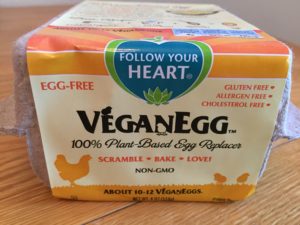
But what’s in those eggs, really?
The main ingredient in VeganEgg is whole algal flour. Whole algal flour is a mixture of fiber, ash, protein, fat, and sucrose, made from a family of algae. Micro algae, like Chlorella protothecoides, is harvested and fermented. The cells are then inactivated by pasteurization, separated from the culture broth, then washed. The pH is adjusted to neutral with potassium hydroxide or sodium hydroxide, and at this point, food-grade antioxidants, like mixed tocopherols, may be added. The end product is homogenized, dried, and packaged.1
Algal protein contains a high amount of important amino acids, such as leucine, valine, phenylalanine, and lysine, and is highly digestible. NASA astronauts even studied algae for consumption in space.2 However, if algae is not sufficiently processed, it can result in a diminished nutritional profile, and possibly, illness.
Algal flour and the adverse effects of algae
Algae does not impact the environment like regular egg (and dairy and meat) production — not even close. Supplementing chicken and pigs’ diets with micro algae also has shown health benefits for those animals, reducing plasma concentration of cholesterol, triglycerides, and fatty acids.3
Those are two good things for animals and the Earth, but what about any adverse effects on us humans? Soylent, for example, claimed algal flour in some of its products was making customers sick with digestive issues late last year. The biotech company that produces the algal flour rebutted, saying that Soylent couldn’t blame algae because of the 40 other ingredients in Soylent products that could have been the culprit.4
The nutritional composition across algae species is not yet well understood; neither is the quantification of any toxic or potentially harmful stuff adsorbed by algae, though it’s Generally Regarded as Safe by the U.S. Food and Drug Administration (FDA). Harvesting (algae can be seasonally fickle and even its protein numbers vary by time of year), storing, and processing also can affect the potential value of products containing algae. The difficulty in protein isolation also makes algal flour more expensive, and therefore some types of vegan eggs three or four times the price of regular eggs, which can be a turnoff for consumers.5
Nutrition deficiencies for vegans
Algae is actually a good source of B12 for vegetarians and vegans, who need to be careful to monitor their B12 consumption to make sure they’re getting enough.6 Nutritional yeast, which is a minor ingredient in VeganEgg, is one example of another B12 source appropriate for vegans, in addition to other fortified foods. As we’ve discovered, vegans also many need to keep an eye on how much Vitamin A they consume, depending on genetics.
Also check out the blog we did on the problem of Vegans getting adequate omega-3.
If you’re curious about starting a vegan diet, check out what happened to John when he went vegan for a week.
Controversy behind plant-based eggs
Although you’ll see a lot more stories about animal byproducts in the news and binge-worthy documentaries on Netflix, the vegan industry hasn’t been without conflict. Take Hampton Creek, whose entire board of directors left in July 2017 amid disagreements with the CEO. The company lost some investor support after news reports showed that it was buying back its own products. Target also removed Hampton Creek products from its stores because of safety concerns, and some disgruntled former employees called to question the science used to create Just Mayo.7
The FDA also fought Hampton Creek on calling its Just Mayo product “mayonnaise,” as legally to be mayonnaise, it must be made with real eggs.8 The American Egg Board, overseen by the U.S. Department of Agriculture, allegedly started badmouthing the products but claimed they broke no laws.9 An investigation showed that members of the $7 billion egg industry spent at least $60,000 to counter Just Mayo’s advances by hiring top PR professionals to influence bloggers with pro-egg messages and deploying pop-up ads to internet users searching for vegan eggs. As famously mentioned in the “What the Health” documentary, emails from top executives in the egg industry also showed them jokingly suggesting to “put a hit on” Hampton Creek’s founder.10
Vegan Egg Taste Test: Are Vegan Eggs Good?
With all that research out of the way, it’s time to get down to what really matters for some people: So, how do vegan eggs taste?
For this Taste Test, I used the only plant-based eggs I could find in stores, VeganEgg. VeganEgg is a 100% plant-based egg replacer, with a 4-oz. carton ($6.99 at Whole Foods) making about 10-12 VeganEggs. You can scramble or bake these, and they are gluten free, allergen free, and cholesterol free, plus non-GMO.
The basic recipe is to use two level (unpacked) tablespoons of VeganEgg, plus a 1/2 cup of ice-cold water. You then whisk vigorously, with a bit more effort than regular eggs. It feels like you’re putting together a cornbread batter — not as lumpy or thick as pancake batter, and smells like cornbread, too. But once you begin mixing, it actually starts to smell like an egg, with a bit of sulfur in the air.
You’ll see that I used two regular vegetarian-fed chicken eggs, plus two VeganEggs, to compare in this Taste Test. Once I started adding the VeganEgg powder to a bowl, I realized I only had one egg’s worth with two eggs’ worth of water, so I quickly added two additional tablespoons for a total of four tablespoons of VeganEgg to make two eggs.
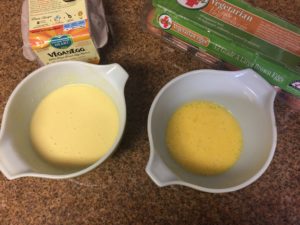
The next step is to pour the vegan eggs into a lightly-oiled skillet (I used Pam coconut-oil spray for both sets of eggs), then immediately scramble. And they mean “immediate.” The second you pour vegan eggs into a hot skillet, they already begin to cook and form a little crust on the bottom. Use a spatula to frequently and evenly scramble until the eggs are firm, about 6-8 minutes, then season to taste.
As they scramble in the pan, the vegan eggs begin to smell like cornbread again. It’s actually a welcome aroma, and I’m excited to try them! They do take a bit longer to cook than regular eggs, so to keep both warm perhaps I should have added the regular eggs 2-3 minutes later to a skillet. They didn’t shrink much, so you still get a little more VeganEgg for your buck than one regular egg, but not a ton.
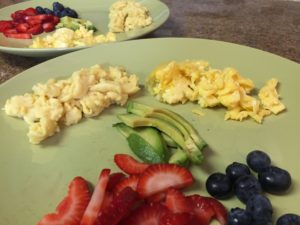
I ended up not seasoning either eggs and I liked the VeganEgg better just on its own. Of course, part of the ingredients include black salt and nutritional yeast, so a bit of added flavor. I ate these alongside some fresh avocado slices, and a vegan overnight oats/chia bowl made with banana, almond/coconut milk blend, and cinnamon, and topped with fresh strawberries, blueberries, and unsweetened coconut flakes. It was a delicious vegan breakfast!
Vegan egg nutrition facts: VeganEgg brand vs. real egg
The entire ingredients label for VeganEgg is as follows: Whole algal flour, whole algal protein, modified cellulose, cellulose, gellan gum, calcium lactate (plant source), carrageenan, nutritional yeast, black salt.
VeganEgg can be stored in the fridge or pantry, but I found them in the refrigerated section with other eggs so just kept them in mine at home.
VeganEgg is marketed as a good source of fiber and calcium, and low in sodium. Let’s see how they compare to the chicken eggs I used, which were Grade A large brown vegetarian eggs made without other animal byproducts, antibiotics, or hormones.
What's in an egg?
| Regular egg | VeganEgg | |
|---|---|---|
| Calories | 70 | 40 |
| Fat calories | 45 | 15 |
| Total fat | 5g | 1.5g |
| Saturated fat | 1.5g | 0g |
| Trans fat | 0g | 0g |
| Cholesterol | 185mg | 0mg |
| Sodium | 70mg | 110mg |
| Total carbohydrates | 0g | 5g |
| Fiber | not a significant source | 4g |
| Sugars | not a significant source | 0g |
| Protein | 6g | 2g |
| Vitamin A | 6% | 0% |
| Vitamin C | 0% | 0% |
| Calcium | 2% | 10% |
| Iron | 4% | 2% |
As you can see, there are some big differences between VeganEgg and chicken eggs, namely, cholesterol. If you consume two regular eggs per day, you’re going over your daily cholesterol limit. (I’ll make a note that I actually fed most of my chicken egg to my dog in this experiment because he wouldn’t stop staring at me, and my boyfriend had the other serving of chicken egg plus one serving of VeganEgg so I wasn’t completely stuffed.)
Chicken eggs have a few more grams of protein per serving, but they don’t have any significant source of fiber (neither fiber nor sugar were listed under their nutrition facts). You also must keep eggs in the refrigerator and should cook them until firm, but who doesn’t love a nice runny egg? In any case, with plant-based eggs, you don’t have to worry about Salmonella poisoning or their freshness quality — I bought my vegan eggs in August and they’re good until January.
What else can I use vegan eggs for?
The packaging for VeganEgg was pretty cute. It was a tiny carton (compostable, made from recycled cardboard and water) that I thought I’d be getting four little weird “eggs” in. Instead, it had a bag of the mixture inside, plus a tip sheet for using VeganEgg and a recipe for gluten-free French toast!
I just followed the instructions for scrambled eggs listed on the top of the container, but VeganEgg also suggests using a blender for fluffier “eggs,” keeping cold water in your fridge to quickly add to the mixture, and using a bit less water if you’re baking with VeganEgg. The box also contained some tips on if making 3+ “eggs,” to use just ¼ cup of water per VeganEgg. So, it might be a little tricky if you’re baking a really large batch of vegan cookies for your coworkers, but most recipes I use for breads, cookies, and muffins call for just two eggs.
Final cool fact: According to the company, 100 VeganEggs can be made with the same water used to produce just one chicken egg. So if you agree with the taste and ingredients in VeganEgg, that’s one more thing to feel good about.
See also: Do plant based diets make us live longer? Separating fact from fiction
Other types of vegan eggs
Obviously, with so many options today on even dairy and non-dairy types of yogurt out there, there’s more than one type of vegan egg customers can purchase. VeganEgg was the only type available at Whole Foods when I did this taste test, but you can check out several other brands on Amazon.com (which, coincidentally, now owns Whole Foods, so maybe there will be even more offerings in the near future).
We took a look at some of the top vegan egg brands available to give a little breakdown of what you might get and how they compare to VeganEgg.
VeganEgg
We’ve already written pretty extensively about VeganEgg in this post, but we liked this brand for the taste and texture of the product, in addition to how well it scrambled compared to a regular egg. VeganEgg, however, is the most expensive of the popular brands on Amazon (even though it’s sold as a two-pack with free shipping). If buying from a local specialty grocery store, you may have better luck cutting your cost a bit.
Bob’s Red Mill Egg Replacer
This vegan egg is safe for those with celiac disease, as it’s made in a gluten-free facility. One Amazon reviewer also noted the long shelf life (over a year). Bob’s Red Mill Egg Replacer may be one of the most economical choices for consumers looking to replace eggs in their diet with a vegan option — but only for baking. Per the manufacturer’s product description on Amazon: “Just don’t try to scramble it or make an egg white meringue – it’s fantastic but it’s not magic!” Hmm. Does that make VeganEgg magic, then?
The Neat Egg
Some people who already use some common at-home egg replacements in baking should be familiar with the main two ingredients in The Neat Egg: chia seeds and garbanzo beans. If you’ve looking into the health benefits of beans and want to add more to your diet, this could be a good option. Neat also has a line of healthy meat replacements (ground beef options) that are certified gluten-free and 100% vegan. Customers on Amazon note that the chickpeas make for a bit of a gritty texture, so they don’t taste good as scrambled eggs but work for things like French toast and pancakes.
Ener-G Foods Egg Replacer
If you’re planning to feed an army anytime soon (or you have a few kids who like to follow a vegan diet), Ener-G Foods Egg Replacer comes in a 16-ounce box and makes a whopping 100 vegan eggs. It replaces eggs completely in baking but cannot be used for anything else. The ingredients are similar to what Bob’s Red Mill makes, minus baking soda and psyllium husk fiber. Baking soda is important in some recipes, so you may need to use these egg replacers differently than another brand (although it does have a different leavening/raising agent, cream of tartar). Ener-G’s vegan egg is also gluten-free, wheat-free, casein-free, yeast-free, sodium-free, and more. It is low in protein, which may or may not be what you’re looking for if you’re strictly vegan.
See also: Can you handle a high-protein diet? The answer may be genetic
Orgran Vegan Easy Egg
Orgran might have the most VeganEgg equivalent of this whole bunch, with the manufacturer stating on Amazon that customers would be able to “experience scrambled eggs, quiche, frittata and omelette recipes.” We haven’t tried Orgran’s brand but are intrigued, though there are very few reviews and one reviewer mentions VeganEgg having a better texture. However, another reviewer said that after becoming severely allergic to eggs 10 years ago, she’s finally found a vegan egg brand she’s impressed with in terms of how easily it replicates the taste and texture of egg, with “no weird taste or aftertaste.” There’s also a Vegan Easy Egg quiche recipe on Orgran’s website that users might be interested in testing out.
Verdict: Will I eat vegan eggs again?
In short, yes!
I’m excited to try it in baked goods, but I actually really enjoyed the taste of them scrambled. I think these will make a nice addition to my breakfast rotation, and since a little bit of protein is a great start to the day, I’ll probably add something else on the side to help replace the few extra grams of protein I’d otherwise get by consuming a regular egg. The chia seeds I had in my vegan overnight oats are a great option.

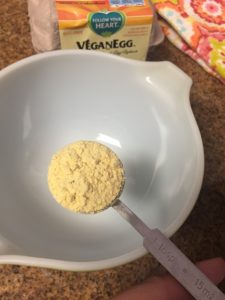
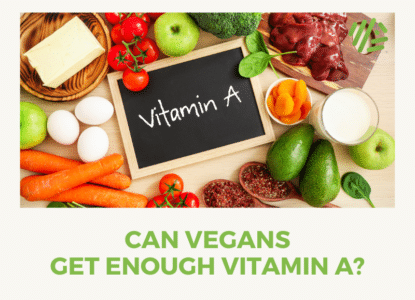
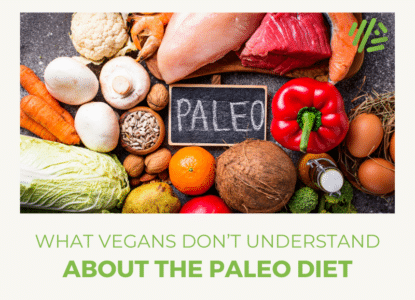
Really impressed by these! They came out better using a medium/low heat and are fantastic in breakfast tacos :)) a nice alternative to tofu scramble but expensive enough i’ll keep using EnerG egg replacer for baking and such
There’s a new vegan egg brand called Vegg but I haven’t tried it yet. I have tried Just Egg but I didn’t like it or at least it isn’t good scrambled.
This is kind of confusing. Chickens lay eggs whether they have dated a rooster or not. I know it is a protein product but doesn’t seem so ‘animal’ since it hasn’t been fertilized. Please help me to understand.
they kill male chicks because their useless in the industry
Meem, I think you’re confusing their question. UNLESS there is a rooster in the coop, those eggs will not be fertilized, hence, it will NOT produce a chick. Even if you keep your own chickens, the same logic applies. A chicken will produce an egg regardless.
Do you mean to say they breed the chickens and select which stay and which become nuggets? If so, that would make tons more sense and keep it relevant to the question.
Yes, it is not about the origin of the eggs, but the origin of the egg layers. They are bred in hatcheries and once they hatch, are sexed and the male chicks are discarded, often in grinders. They do not become nuggets, as they are the male version of a lineage bred for egg laying, useless for meat.
I had that conversation few times with non-vegans. Even if the egg is not fertilised it comes from a chicken that most likely has been captured and enslaved. Also chickens use a lot of own minerals and vitamins to produce eggs and when egg is not being fertilised then the chicken will peck on it and eat the insides to regain strength.
Also we need to ask ourselves where does the chicken come from ? – It has been captured and reproduced on the farm. It comes from a breeder not wilderness. Chicken does not wonder round to your house and asks to stay with you.
When we buy chickens or eggs we support animal industry.
Spiritually speaking, it is and always has been okay to eat eggs or cheese, or drink milk. The catch is that a person is wanting to know that the chicken or the goat is well treated and the products do not come from a commercial venture because those environments are not conducive to treating animals or poultry well.
I eat eggs that come from my own ducks. No rooster is in residence. I drink milk and make cheese from our own goats milk. Some people get a little crazy in the whole vegan description. I use honey from my own bees. I would never buy honey because they keep them in horrible little boxes, steal their honey and feed them sugar water in the winter instead of letting the bees use that honey for their babies. I take honey only in the spring….whatever is left from the winter store before they start to make new honey. Common sense should rule. No need for fanaticism…..
Not all vegans opt out of chicken egg use purely for health. I’d much rather use an egg alternative than be responsible for the death of thousands of newly hatched male chicks by barbaric means ✌🏻
DO NOT EAT THE VEGAN EGG! IT HAS MADE ME SICK MULTIPLE TIMES WITH HORRIBLE VOMITING
Vomit both times I ate Vegan Egg. Really sad…
Yes. Soylent had a massive recall because many of their customers were getting sick from the algal flour. I make my own vegan eggs….just adding nutritional yeast and black namak salt to medium crumbled tofu. I drain the tofu then crumble it, pan fry it with the yeast until it gets a little crusty, then I add the salt and a little homemade cashew cheese. Pretty tasty.
“it actually starts to smell like an egg, with a bit of sulfur in the air” – if your egg smells of sulfur, it’s gone bad! Like fish … if they smell of fish, they’ve gone bad.